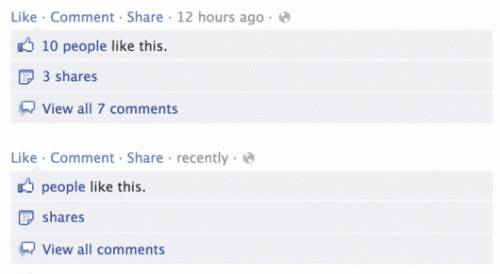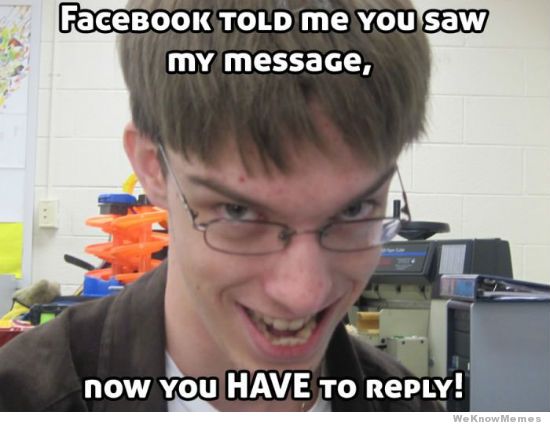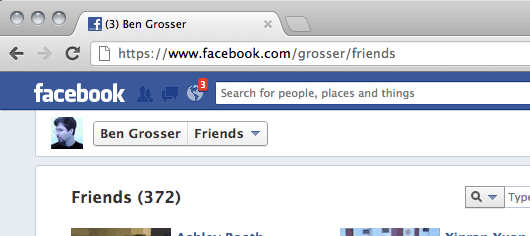I’ve been meaning to write for a while now about Ben Grosser’s (@bengrosser) project the Facebook Demetricator. If you haven’t seen it yet, the Demetricator is a browser extension that removes all the overt quantification from your experience of Facebook. With Facebook Demetricator installed and toggled ON, it doesn’t matter if 2, 20, or 20,000 people like your most recent status update (for example); when you view that status update, you see simply “people like this.” Visit someone’s profile, and you see that they have “Friends”—not “Friends 450” or “Friends 4,500.” “View all 6 comments” becomes “View all comments,” and “n hours ago” becomes either “recently” or “a while ago.
Grosser explains that,
As a regular user of Facebook I continually find myself being enticed by its endless use of numbers. How many likes did my photos get today? What’s my friend count? How much did people like my status? I focus on these quantifications, watching for the counts of responses rather than the responses themselves, or waiting for numbers of friend requests to appear rather than looking for meaningful connections. In other words, these numbers lead me to evaluate my participation within the system from a metricated viewpoint.
He further posits that “the site’s relentless focus on quantity leads us to continually measure the value of our social connections within metric terms, and this metricated viewpoint may have consequences on how we act within the system.” I’d take this one step further, and argue that if Facebook’s ‘quantification fetish’ influences how we act within the context of Facebook (and it probably does), then it also influences how we act outside the context of Facebook. (Recall that social media has an affect on our experiences of being in the world even when we’re not using it, and even if we ourselves don’t use it at all.)
The Facebook Demetricator additionally aims to highlight capitalism as a motivating force, both for Facebook users (in their constant quest for “more” of anything with a number on it) and for Facebook itself. In an interview, Grosser asks, “What purpose does this enumeration serve for a system (and a corporation) that depends on its user’s continued free labor to produce the information that fills its databases?” Facebook is, of course, tracking pretty much everything everyone does on the site (as well as what people do off the site), but only some of that tracking is revealed to users. Grosser posits that Facebook designers choose to show metrics that spur users to spend more time on the site (through that ‘craving for more’), and don’t bother to make visible metrics that might decrease user participation on the site. (Can you imagine what would happen if Facebook displayed how many minutes you’d spent that month on Facebook?)

As I commented to Ernesto Ramirez (@e_ramirez), who first told me about Facebook Demetricator, there’s obviously a lot going on with visibility in this project—though by my read, there may be more going on there than Grosser intended. On the one hand, by erasing the visible artifacts of Facebook’s quantification algorithms, the Demetricator can draw our attention to the ways those metrics motivate our behavior on the site (as well as our feelings about our interactions on the site); perhaps with continued use and additional reflection, Facebook Demetricator could also help to illuminate the ways those metrics (and other similar metrics) influence our behavior and feelings outside of Facebook. And I do particularly love the conversion of “#n people like this” to simply “people like this,” though even a month later, I’m not entirely sure I can articulate why.
There is, however, an inevitable bit of ‘reveal and conceal’ happening here. By concealing what Facebook chooses to reveal, Facebook Demetricator in turn reveals the concealed free labor capitalism that structures Facebook’s design and shapes how we use the site. But by drawing our attention to the obviously tracked and quantified elements of our experiences on Facebook, could Facebook Demetricator deflect our attention away from all the numbers, scores, and algorithms that structure our experiences of Facebook ‘behind the scenes’?
Grosser has acknowledged that Facebook employs many more metrics than are ever visible to Facebook users, and Facebook Demetricator does not claim to eliminate the quantifying algorithms themselves from users’ experiences on the site. Yet as Grosser states, “adding a metric to a line in Facebook implies that the data goes deeper, that there’s more to know than what you see.” This is precisely why I wonder if, by concealing the most visible signs that Facebook is tracking our every move, Facebook Demetricator doesn’t accidentally further conceal the fact that Facebook’s metrics and algorithms not only shape what we see and who sees us[i], but also track our every move. The free labor we perform when we use Facebook goes beyond providing visible content that lures our friends back to the site to do likewise; we also provide and generate a wealth of invisible content for Facebook’s databases and for Facebook’s third-party ad partners.

What I’d really love to see—though it would be virtually impossible to do without Facebook’s cooperation, and somehow I don’t think Facebook would be into it—is a sequel to Facebook Demetricator called the Facebook Reciprometricator. This fantasy browser extension would erase all the ordinarily visible metrics of Facebook (as does Facebook Demetricator), but would make visible a whole host of new metrics that are usually for Facebook’s eyes only. I want little red numbers for, say, “You’ve spent n hours on Facebook this month,” “You’ve been placed in n target demographic subgroups,” and “n third party apps have received access to your profile through your friends.” That Facebook wouldn’t welcome this in the least seems to underscore Grosser’s point: that perhaps Facebook metrics shape our feelings and behavior more than we realize.
Whitney Erin Boesel still vastly prefers Twitter to Facebook. You can follow her at @phenatypical
Demetricator GIF and comparison image from http://bengrosser.com/projects/facebook-demetricator/
Facebook stalker image from http://weknowmemes.com/2012/06/facebook-stalkers/
[i] For a brief moment, you could get around some of this and access your raw, algorithm-free newsfeed—but far as I can tell, Facebook’s already put a stop to that. Pity.


Comments 12
Doug Hill — November 25, 2012
Great! Thanks for this, for alerting me to the Facebook Demetricator, and for the links to the earlier essays (yours and Nathan's). Beautiful points on how this stuff creeps into your consciousness, even when you think you thinking about it.
nathanjurgenson — November 25, 2012
i wonder, to take another path than i usually do, what it means to belittle social media quantifiers (likes, shares, comments, friends, followers, RTs, favorites, reblogs, repins and on and on). we quickly critique these metrics, and for good reason, but we almost never take a moment to reflect that social media metrics are a source of great pleasure for people in their everyday lives. of course, they also may be a source of anxiety, worry, insecurity and so on, but i wonder if we should at least make reference that many people are made very happy by waking up to a hundred "likes" on that photo of their newborn baby. the Demetricator would say that "people like" both your status update saying you are sleepy as well as one in where announce you are engaged.
of course, just because something brings people pleasure doesn't mean we should refrain from critique. but don't we have an obligation to at least recognize this in our critiques? what this might mean, for instance, is not just outlining why metrics are harmful, but under what justification can we claim that the pleasure gained through a bunch of people favoriting your tweet is disqualified pleasure, unworthy, and worth erasing.
Erin — November 28, 2012
I have often wondered what my life would be like without Facebook. I check it constantly throughout the day on my computer and on the application on my phone. I'm always searching for more "likes" or "comments" or "friend requests." I feel as though my social worth is decided by the number of people I interact with on Facebook. I have thought on many occasions about deleting my Facebook, but it truly connects me to my friends and family.
Facebook without quantification would probably initially drive me crazy, because I love seeing who "likes" my posts. But ultimately I think it would heal the unhealthy obsession that my generation have with Facebook and help us measure our self-worth by other factors.
The imperceptible impact of social media on our everyday lives | "It's not about what you cover, it's about what you discover." — November 28, 2012
[...] consistently excellent Cyborgology blog recently speculated how different Facebook would be if you removed likes, comments and friend counts. In other words, [...]
Weekend Reading « Backslash Scott Thoughts — December 1, 2012
[...] What Would Facebook Look Like Without Quantification? [...]
the facebook demetricator: un-count your likes. | Abler. — December 2, 2012
[...] A lengthy interview with Ben, and very sharp analysis on Cyborgology by Whitney Boesel: “I wonder if, by concealing the most visible signs that Facebook is [...]
Ben Grosser — December 3, 2012
Thanks Whitney for your considered thoughts on Demetricator. A few responses:
"But by drawing our attention to the obviously tracked and quantified elements of our experiences on Facebook, could Facebook Demetricator deflect our attention away from all the numbers, scores, and algorithms that structure our experiences of Facebook ‘behind the scenes’?
... This is precisely why I wonder if, by concealing the most visible signs that Facebook is tracking our every move, Facebook Demetricator doesn’t accidentally further conceal the fact that Facebook’s metrics and algorithms not only shape what we see and who sees us[i], but also track our every move."
I have thought about this possibility with the system---that users become so comfortable with a demetricated Facebook experience that they forget that any metrics ever existed. This would certainly negate some of its intended effects.
However, I think that two aspects of the software's design may be working against this possibility. I wonder if these resonate with those of you who have now used it for a bit?
First, is that Demetricator can't remove the metrics until they first appear. I can do it very quickly, such as immediately after the page first loads, or right after you like a status or comment on a photo, but there is short moment of time (usually less than 500ms) where the number appears before it's removed, or appears briefly after an action before being removed. I would suggest that this blip of visibility serves as constant reminder that while you think you're enjoying a metric-free Facebook experience, that it's not really metric-free. It only *looks* that way.
(If you don't know what I'm talking about, watch the notification icons while reloading the page, or watch the 'people like this' line when pressing 'like' yourself. In each case you'll see the number flash for a second).
Second is the Demetricator toggle checkbox in the menu. This interface element gives the user a choice, at all times, whether to show or hide the metrics. While it's default state is on (demetricated), I wonder if its presence wouldn't serve as the same type of reminder that metrics are always present underneath the surface.
As users of the system do these ideas resonate? I'm not the best test case as I've become hyper-aware of the metrics as I constantly search for new ones to demetricate and old ones that need to be fixed up after a Facebook code change.
Interestingly, I've gotten a number of emails from users asking to fix both of these issues as if they were bugs. Some want a cleaner, more pure erasure of the numbers. No blips of quantifications before removal, no Demetricator menu item or checkbox. I won't be changing these things, but it's interesting that some want them.
On the Reciprometricator idea, I wish I could! Only FB could really do this. However, I'm working on a new idea for both an installation work and possibly a software system that draws on this notion of hidden metrics. Stay tuned...
Press Coverage of Facebook Demetricator | benjamin grosser — December 19, 2012
[...] della Sera [Italy]: Il Facebook Demetricator per liberarsi dalla schiavitù dei like Cyborgology: What Would Facebook Be Like Without Quantification? Rookie: Saturday Links Grand Text Auto: Statistics Outta My Face Rhizome: Don’t Give Me [...]
The imperceptible impact of social media on our everyday lives | another social blog — October 14, 2013
[...] consistently excellent Cyborgology blog recently speculated how different Facebook would be if you removed likes, comments and friend counts. In other words, [...]
The Imperceptible Impact Of Social Media On Our Everyday Lives | jimsebastian — March 17, 2015
[…] consistently excellent Cyborgology blog recently speculated how different Facebook would be if you removed likes, comments and friend counts. In other […]